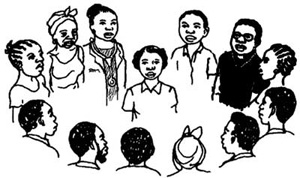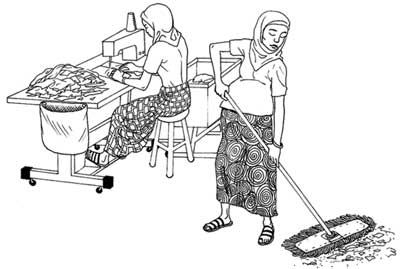
Advocacy is speaking up for, or acting on behalf of, yourself or another person. Community mobilisation refers to a broad scale movement to engage people's participation in achieving a specific goal through self-reliant efforts. Advocacy and community mobilisation will help you to gain and sustain the involvement of a broad range of influential individuals, groups and sectors at different levels in the community, who will support the antenatal care programme.
If you are successful in educating advocates to speak up for antenatal care, and in mobilising broad scale support for the service, the outcomes can include:
Engaging the support of advocates who are 'opinion leaders' or 'key persons' in your locality is an important task. Well-known and respected elders, traditional or religious leaders, and 'wise persons' whose advice and words are accepted in the community, can convince others of the benefits of the antenatal care service by exerting social pressure. The tendency of community members to agree with them is important in conveying your health messages and getting acceptance from others.
You can use these community-honoured leaders to communicate positive messages about antenatal care if you give them the right information, and you are ready to use them as advocates. Advocacy by respected leaders can make sure people maintain the positive behaviour changes you have brought about through health education.
Try to get the maximum number of people involved in the promotion of antenatal care, so that the community will really strengthen its support for pregnant women's health.

Do men have a role in antenatal care?
Yes! Their involvement is very important, because men can influence whether pregnant women in their family attend antenatal care check-ups regularly, and follow your health advice.

As much as possible, encourage men to be partners in improving women's health. Husbands, fathers, sons, community leaders, spiritual leaders, bosses and other men all play a role in how healthy women will be in relation to pregnancy, labour and delivery. If the men of the community feel responsible for the health of women, the whole community will benefit. So help men to be involved in the promotion of antenatal care.
Build on the roles and skills that men already have. For example, in many communities men are seen as protectors. Help men learn how to protect the health of women. Encourage men to share the responsibilities of pregnancy and parenting. Men can care for children in the same ways that women do — comforting, bathing, feeding, teaching, and playing with them. Invite women and men to community meetings, and encourage women to speak up. Sometimes women feel reluctant to speak about pregnancy and birth issues in front of men.
Work with men who are sympathetic to women's needs. They can talk to other men who may listen more closely to a man than to a woman. When you discuss antenatal care with them, try to give practical suggestions. Men who care very much about the health of women in their lives may not know where to start. For example:
